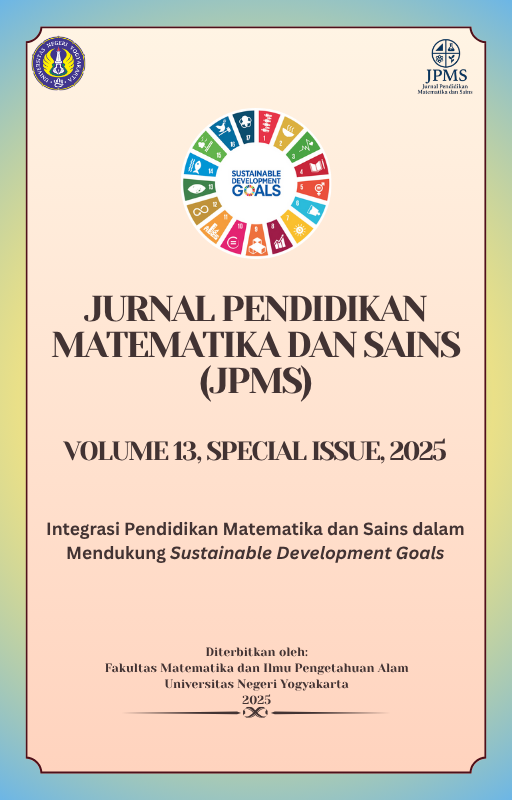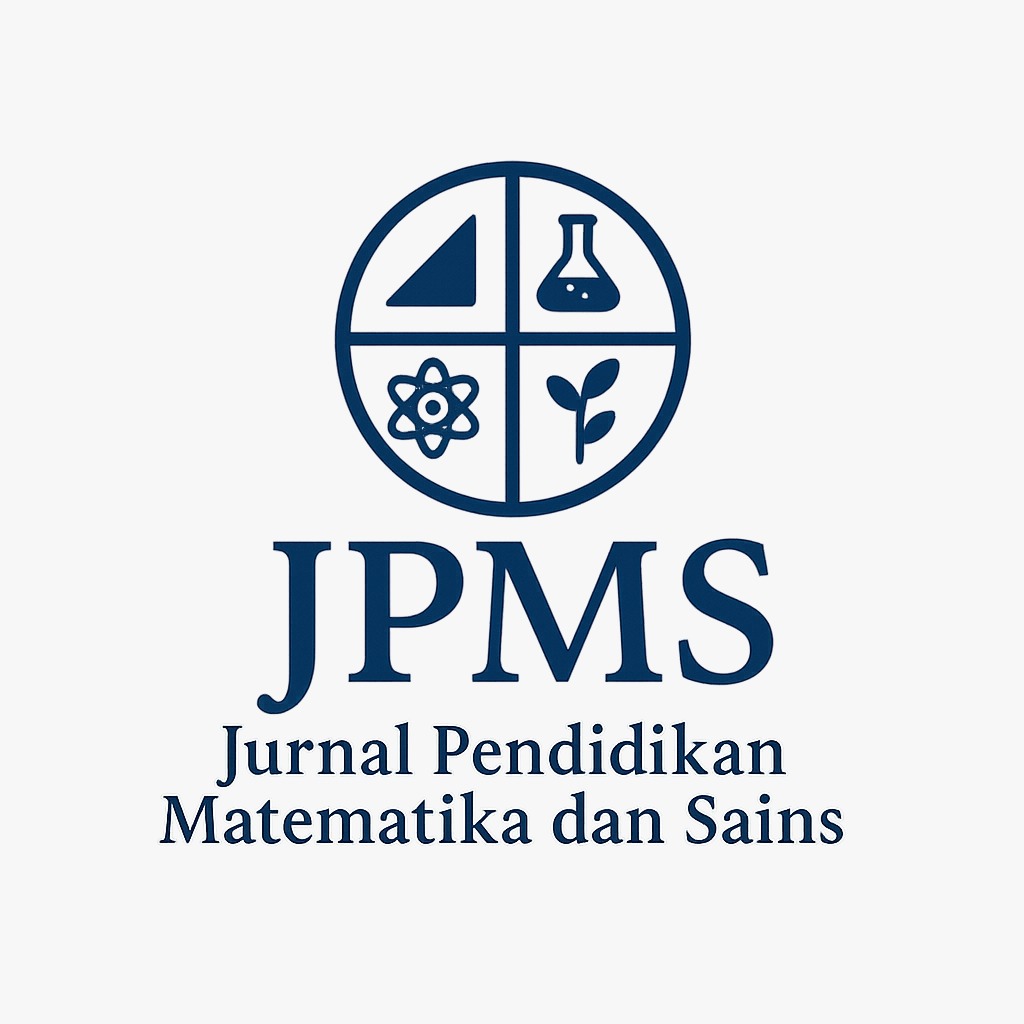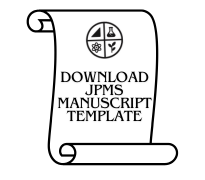Pengembangan KIT Smart-System with Solar Panel and Sound Sensor Menggunakan Pendekatan STEM pada Materi Pengenalan Instrumen Digital
DOI:
https://doi.org/10.21831/jpms.v13iSpecial_issue.88718Keywords:
KIT smart-system, Pengembangan media, STEMAbstract
Penelitian ini bertujuan untuk mengembangkan media pembelajaran KIT Smart-System with Solar Panel and Sound Sensor berbasis pendekatan STEM (Science, Technology, Engineering, and Mathematics) guna meningkatkan hasil belajar peserta didik pada materi pengenalan instrumen digital. Metode yang digunakan adalah Research and Development (R&D) dengan model pengembangan 4D (Define, Design, Develop, Disseminate). Validasi media dilakukan dengan 10 expert judgement, dengan hasil kelayakan rata-rata 92% pada aspek alat dan Lembar Kerja Peserta Didik (LKPD), serta validasi instrumen pembelajaran memperoleh nilai CVI sebesar 1,00. Kepraktisan diuji menggunakan User Experience Questionnaire (UEQ) dan memperoleh skor tertinggi pada skala Attractiveness (1,44) dan Stimulation (1,42), yang menunjukkan respon sangat positif. Efektivitas media dianalisis melalui n-Gain dengan rata-rata skor pre-test 40,5 dan post-test 78,2, menghasilkan nilai n-Gain sebesar 0,62 (62%), yang tergolong cukup efektif. Hasil ini menunjukkan bahwa KIT Smart-System sangat layak, praktis, dan cukup efektif digunakan sebagai media pembelajaran fisika berbasis pendekatan STEM secara optimal dan berlanjutan.
References
Abdulrahaman, M. D., Faruk, N., Oloyede, A. A., Surajudeen-Bakinde, N. T., Olawoyin, L. A., Mejabi, O. V., Imam-Fulani, Y. O., Fahm, A. O., & Azeez, A. L. (2020). Multimedia tools in the teaching and learning processes: A systematic review. Heliyon, 6(11), e05312. https://doi.org/10.1016/j.heliyon.2020.e05312
Abdurrahman, A., Maulina, H., Nurulsari, N., Sukamto, I., Umam, A. N., & Mulyana, K. M. (2023). Impacts of integrating engineering design process into STEM makerspace on renewable energy unit to foster students’ system thinking skills. Heliyon, 9(4), e15100. https://doi.org/10.1016/j.heliyon.2023.e15100
Al-Zuhair, S., Fardoun, A., Nour, M., & Abdulrazak, A. (2014). Renewable energy education for engineering freshman students. Asian Journal of Education and e-Learning, 2(3), 173-184.
Ananingtyas, R. S. A., Sakti, R. E., Hakim, M. H., & Putra, F. N. (2022). Pengembangan media pembelajaran berbasis arduino pada pembelajaran STEM dalam meningkatkan literasi sains dan digital. Briliant: Jurnal Riset dan Konseptual, 7(1), 178. https://doi.org/10.28926/briliant.v7i1.795
Arfandi, S. D., Rozaq, Y. A., Febiyanti, W., Yudhistira, W., & Rahayu, E. T. (2023). Efektifitas tactical games model dalam kurikulum merdeka pada permainan bola basket terhadap kerjasama siswa sekolah menengah kejurusan. Jurnal Pendidikan dan Konseling, 5(1), 2808–2813.
Ate, O., Parno, P., & Munfaridah, N. (2025). Multirepresentation in physics learning research: a content analysis review of trends, opportunities, and challenges. Journal of Science Education Research, 9(1), 32–42. https://doi.org/10.21831/jser.v9i1.72954
Ayubi, M. S. A., & Sudomo, R. I. (2020). Pengembangan media pembelajaran pada mata pelajaran jaringan dan dasar komputer. Universitas IVET, 3(2), 32–39.
Azhari, A., Irwandi, I., Jalil, Z., Ilhamsyah, Y., Sulastri, S., Muhibuddin, M., & Rasul, M. S. (2023). Integration Merdeka Belajar concept in development STEMC module for electrochemical and renewable energy at vocational school SMK SMTI Banda Aceh. Journal of Physics: Conference Series, 2596(1), 012076. https://doi.org/10.1088/1742-6596/2596/1/012076
Carmo, S., Miranda, L., Silva, C., & Souza, H. (2025). Forensic toolbox: active learning strategy for promoting science education. Journal of Chemical Education, 102(7), 2873–2879. https://doi.org/10.1021/acs.jchemed.4c01093
Chamrat, S., Manokarn, M., & Thammaprateep, J. (2019). STEM literacy questionnaire as an instrument for STEM education research field: Development, implementation, and utility. AIP Conference Proceedings, 2081(1), 030013. https://doi.org/10.1063/1.5094011
Chen, R., Goodman, D., Izadian, A., & Cooney, E. (2010). Teaching renewable energy through hands on project based learning for engineering technology students. 2010 Annual Conference & Exposition Proceedings, 15.1186.1-15.1186.8. https://doi.org/10.18260/1-2--15788
Daryanes, F., Darmadi, D., Fikri, K., Sayuti, I., Rusandi, M. A., & Situmorang, D. D. B. (2023). The development of articulate storyline interactive learning media based on case methods to train student’s problem-solving ability. Heliyon, 9(4), e15082. https://doi.org/10.1016/j.heliyon.2023.e15082
Dewi, P. Y. A., & Primayana, K. H. (2019). Effect of learning module with setting contextual teaching and learning to increase the understanding of concepts. International Journal of Education and Learning, 1(1), 19–26. https://doi.org/10.31763/ijele.v1i1.26
Ellitan, L. (2020). Competing in the era of industrial revolution 4.0 and society 5.0. Jurnal Maksipreneur: Manajemen, Koperasi, Dan Entrepreneurship, 10(1), 1. https://doi.org/10.30588/jmp.v10i1.657
Ernawati, I. (2017). Uji kelayakan media pembelajaran interaktif pada mata pelajaran administrasi server. Elinvo (Electronics, Informatics, and Vocational Education), 2(2), 204–210. https://doi.org/10.21831/elinvo.v2i2.17315
Fadilah, Z., & Lubis, P. (2018). Pengaruh metode demonstrasi dengan menggunakan alat peraga sel surya terhadap hasil belajar fisika materi listrik dinamis pada kelas XII di SMA Negeri 8 Palembang. Jurnal Inovasi dan Pembelajaran Fisika, 5(2), 56–61. http://download.portalgaruda.org/article.php?article=vol%202.%20no%201
Fadoli, J. (2022). Exploring lesson plans through learning objectives written by english teachers. Journal Of Education And Teaching Learning (JETL), 4(3), 265–273. https://doi.org/10.51178/jetl.v4i3.917
Fa’izah, J. N., Romadhon, D. R., & Suwarna, I. P. (2024). Development of arduino-based inclination board on newton’s laws topic. AIP Conference Proceedings, 3058(1), 020025. https://doi.org/10.1063/5.0201051
Fukuda, kei. (2021). Chapter 2 science, technology, and innovation policy toward realization of society 5.0. Springer, 15–25. https://doi.org/10.1007/978-981-15-2989-4_2
Fukuda, K. (2020). Science, technology and innovation ecosystem transformation toward society 5.0. International Journal of Production Economics, 220, 107460. https://doi.org/10.1016/j.ijpe.2019.07.033
Hake, R. R. (1998). Interactive-engagement versus traditional methods: A six-thousand-student survey of mechanics test data for introductory physics courses. American Journal of Physics, 66(1), 64–74. https://doi.org/10.1119/1.18809
Hanif, Q., Budiyanto, C. W., & Yuana, R. A. (2021). Abstract thinking skills of high school students in stem learning: literature review. Journal of Physics: Conference Series, 1808(1), 012019. https://doi.org/10.1088/1742-6596/1808/1/012019
Hennessy, S., D’Angelo, S., McIntyre, N., Koomar, S., Kreimeia, A., Cao, L., Brugha, M., & Zubairi, A. (2022). Technology use for teacher professional development in low- and middle-income countries: a systematic review. Computers and Education Open, 3, 100080. https://doi.org/10.1016/j.caeo.2022.100080
Hertzog, P. E., & Swart, A. J. (2017). Design and development of practical instruction for freshmen engineering students in a renewable energy course. 2017 IEEE Global Engineering Education Conference (EDUCON), 838–843. https://doi.org/10.1109/EDUCON.2017.7942944
Hikmawati, H., Kusmiyati, K., & Sutrio, S. (2019). Keterampilan psikomotor siswa dalam melakukan kegiatan percobaan tentang suhu dan kalor menggunakan media tiga dimensi dan simulasi komputer. Jurnal Penelitian dan Pembelajaran Fisika Indonesia, 1(1), 1–5. https://doi.org/10.29303/jppfi.v1i1.100
Ika Sari, G., Winasis, S., Pratiwi, I., Wildan Nuryanto, U., & Basrowi. (2024). Strengthening digital literacy in Indonesia: Collaboration, innovation, and sustainability education. Social Sciences & Humanities Open, 10, 101100. https://doi.org/10.1016/j.ssaho.2024.101100
Jeranoski, L., & Leitão, P. (2024). Development of STEM Curriculum for digital electronics education in secondary school. 2024 IEEE Global Engineering Education Conference (EDUCON), 1–7. https://doi.org/10.1109/EDUCON60312.2024.10578762
Johnson, A. M., Jacovina, M. E., Russell, D. G., & Soto, C. M. (2016). Challenges and solutions when using technologies in the classroom. In S. A. Crossley & D. S. McNamara (Eds.), Adaptive Educational Technologies for Literacy Instruction (1st ed., pp. 13–30). Routledge. https://doi.org/10.4324/9781315647500-2
Jones, M., Geiger, V., Falloon, G., Fraser, S., Beswick, K., Holland-Twining, B., & Hatisaru, V. (2025). Learning contexts and visions for STEM in schools. International Journal of Science Education, 47(3), 337–357. https://doi.org/10.1080/09500693.2024.2323032
Kandia, I. W. (2023). The Strategic Role of Learning Media in Optimizing Student Learning Outcomes.
Kementerian Pendidikan, Kebudayaan, Riset, dan Teknologi. (2022). Permendikbudristek Nomor 16 Tahun 2022 tentang Standar Proses. Kemendikbudristek.
Khaffi, A., & Idris, A. R. (2020). Rancang Bangun Modul Trainer Pembangkit Listrik Tenaga Surya (PLTS).
Kwangmuang, P., Jarutkamolpong, S., Sangboonraung, W., & Daungtod, S. (2021). The development of learning innovation to enhance higher order thinking skills for students in Thailand junior high schools. Heliyon, 7(6), e07309. https://doi.org/10.1016/j.heliyon.2021.e07309
Lestari, D. A., & Sucahyo, I. (2023). Pengembangan alat peraga mini sopetric (solar powered electricity) pada materi energi alternatif di kelas X SMA. Jurnal Ilmu Pendidikan dan Pembelajaran, 1(2), 77–90. https://doi.org/10.58706/jipp.v1n2.p77-90
Luciana, L., Marlina, L., & Fathurohman, A. (2025). Python-Based Interactive Simulation in STEM E-LKPD to increase sustainability awareness on global warming material. Jurnal Penelitian Pendidikan IPA, 11(3), 1158–1166. https://doi.org/10.29303/jppipa.v11i3.10644
Marar, S., Hamza, M. A., Ayyash, M., & Abu-Shaheen, A. (2023). Development and validation of an instrument to assess the knowledge and perceptions of predatory journals. Heliyon, 9(11), e22270. https://doi.org/10.1016/j.heliyon.2023.e22270
Maritsa, A., Hanifah Salsabila, U., Wafiq, M., Rahma Anindya, P., & Azhar Ma’shum, M. (2021). Pengaruh teknologi dalam dunia pendidikan. Al-Mutharahah: Jurnal Penelitian dan Kajian Sosial Keagamaan, 18(2), 91–100. https://doi.org/10.46781/al-mutharahah.v18i2.303
Maslakhah, I. F., Jatmiko, B., & Sanjaya, I. G. M. (2024). Development of Physics Learning Media: A Literature Review. IJORER : International Journal of Recent Educational Research, 5(2), 317–333. https://doi.org/10.46245/ijorer.v5i2.558
Melati, F., Jufrida, J., Syafitri, N., & Adlim, A. (2025). Comparative study of students’ conceptual understanding of Newton’s laws through virtual and laboratory experiments. Jurnal Penelitian Pendidikan IPA, 11(1), 132–139. https://doi.org/10.29303/jppipa.v11i1.10738
Moreno Olivos, T. (2016). Evaluación del aprendizaje y para el aprendizaje: Reinventar la evaluación en el aula. Universidad Autónoma Metropolitana, Unidad Cuajimalpa, División de Ciencias de la Comunicación y Diseño.
Mupa, P., & Chinooneka, T. I. (2015). Factors contributing to ineffective teaching and learning in primary schools: Why are schools in decadence? Journal of Education and Practice.
Mustakim, W., Effendi, H., Aswardi, Giatman, M., Hariyadi, & Dwi Pratiwi, W. (2024). Development of internet of things trainer kit as a learning media for digital circuit subjects in higher education. International Journal of Online and Biomedical Engineering (iJOE), 20(09), 4–16. https://doi.org/10.3991/ijoe.v20i09.48349
Naeem, M., Ozuem, W., Howell, K., & Ranfagni, S. (2023). A Step-by-step process of thematic analysis to develop a conceptual model in qualitative research. International Journal of Qualitative Methods, 22, 16094069231205789. https://doi.org/10.1177/16094069231205789
Nurmala, S., Triwoelandari, R., & Fahri, M. (2021). Pengembangan media articulate storyline 3 pada Pembelajaran IPA berbasis STEM untuk mengembangkan kreativitas siswa SD/MI. Jurnal Basicedu, 5(6), 5024–5034. https://doi.org/10.31004/basicedu.v5i6.1546
Nurwahidah, A., Qolbi, W. N., Putra, R. M., & Muhajir, S. N. (2021). Persepsi siswa dan guru terhadap penggunaan laboratorium virtual dalam pembelajaran fisika. Jurnal Pendidikan dan Ilmu Fisika, 1(2), 54–61. https://doi.org/10.52434/jpif.v1i2.1482
Direktorat Pembinaan Sekolah Menengah Atas. (2011). Panduan pembuatan alat peraga fisika sederhana untuk SMA. Direktorat Jenderal Pendidikan Menengah, Kementerian Pendidikan dan Kebudayaan.
Pauw, J., Gericke, N., Olsson, D., & Berglund, T. (2015). The Effectiveness of Education for Sustainable Development. Sustainability, 7(11), 15693–15717. https://doi.org/10.3390/su71115693
Permatasari, A., Yuberti, Y., & Anggraini, W. (2019). Pengembangan lampu sensor berbasis arduino uno sebagai alat peraga fisika. Indonesian Journal of Science and Mathematics Education, 2(3), 380–387. https://doi.org/10.24042/ijsme.v2i3.4364
Pratama, F. I., & Rohaeti, E. (2024). How does “chemistry challenge” e-book affect the chemical literacy profile? A study to test learning media Effectiveness. Jurnal Penelitian Pendidikan IPA, 10(5), 2253–2260. https://doi.org/10.29303/jppipa.v10i5.7018
Pratama, F. I., Rohaeti, E., & Laksono, E. W. (2025). Building sustainable education with the literacy and research-oriented cooperative problem-based learning: A bridge in the activeness of chemistry education students. Jurnal Pendidikan Matematika Dan Sains, 13(Special_issue), 61–68. https://doi.org/10.21831/jpms.v13iSpecial_issue.88392
Republik Indonesia. (2021). Peraturan pemerintah nomor 57 tahun 2021 tentang standar nasional pendidikan. Sekretariat Negara.
Rizk, J., & Hillier, C. (2022). Digital technology and increasing engagement among students with disabilities: Interaction rituals and digital capital. Computers and Education Open, 3, 100099. https://doi.org/10.1016/j.caeo.2022.100099
Rogosic, R., Heidt, B., Passariello-Jansen, J., Björnör, S., Bonni, S., Dimech, D., Arreguin-Campos, R., Lowdon, J., Jiménez Monroy, K. L., Caldara, M., Eersels, K., Van Grinsven, B., Cleij, T. J., & Diliën, H. (2021). Modular Science Kit as a support platform for STEM learning in primary and secondary school. Journal of Chemical Education, 98(2), 439–444. https://doi.org/10.1021/acs.jchemed.0c01115
Saa, S. (2024). Merdeka curriculum: adaptation of indonesian education policy in the digital era and global challenges. Revista de Gestão Social e Ambiental, 18(3), e07323. https://doi.org/10.24857/rgsa.v18n3-168
Sampurno, Y. G., Fauzi, N. A., Wahyudi, K. S., & Imawan, M. (2025). Pelatihan teknologi hijau: Pengenalan sepeda motor listrik dan konversi sepeda motor bensin menjadi sepeda motor listrik. Journal Bulletin of Community Services 1(1), 3026-4994. https://doi.org/10.35882/bp.v2i1.15.
Saputra, I. G. P. E. (2023). Pengembangan media pembelajaran fisika berbantuan lectora inspire untuk meningkatkan hasil belajar fisika siswa di era kurikulum merdeka. Jurnal Penelitian Pendidikan Fisika, 8(4), 229–239. https://doi.org/10.36709/jipfi.v8i4.92
Sari, P. P., Luardini, M. A., & Asi, N. (2020). An analysis of learning objective in english teacher lesson plans based on abcd aspect. Jurnal Pendidikan Bahasa Inggris, 8(3), 60–00.
Schrepp, M., Hinderks, A., & Thomaschewski, J. (2017). Construction of a benchmark for the user experience questionnaire (UEQ). International Journal of Interactive Multimedia and Artificial Intelligence, 4(4), 40. https://doi.org/10.9781/ijimai.2017.445
Sesmiyanti, S., Antika, R., & Suharni, S. (2019). N-Gain algorithm for analysis of basic reading. Proceedings of the Proceedings of the 2nd International Conference on Language, Literature and Education, ICLLE 2019, 22-23 August, Padang, West Sumatra, Indonesia. https://doi.org/10.4108/eai.19-7-2019.2289527
Singh, G., & Ahmad, F. (2024). An interactive augmented reality framework to enhance the user experience and operational skills in electronics laboratories. Smart Learning Environments, 11(1), 5. https://doi.org/10.1186/s40561-023-00287-1
Sofirin, M., Rahim, A., & Najib, K. H. (2025). Development of Interactive Flash Card Media in Cultural Diversity Learning.
Souza, A. S. C. D., & Debs, L. (2024). Concepts, innovative technologies, learning approaches and trend topics in education 4.0: A scoping literature review. Social Sciences & Humanities Open, 9, 100902. https://doi.org/10.1016/j.ssaho.2024.100902
Sugiyono. (2019). Metode penelitian & pengembangan research and development. Alfabeta.
Suhendro, S., Surya, E., Rajagukguk, W., & Syahputra, E. (2018). Development of learning instrument based on scientific learning to improve students’ mathematical problem solving and self-regulated learning ability at mts. sinar islami bingai. American Journal of Educational Research, 6(10), 1430–1437. https://doi.org/10.12691/education-6-10-14
Suryadi, A., Lidya, N., Habibah, H., & Suwarna, I. P. (2024). Study on the development and implementation of an interdisciplinary solar panel project to enhance students’ interest in STEM. Research and Development in Education (RaDEn), 4(1), 415–427. https://doi.org/10.22219/raden.v4i1.32881
Suwarna, I. P. (2016). Pengembangan instrumen ujian komprehensif mahasiswa melalui computer based test pada program studi pendidikan fisika. Pusat Penelitian Dan Penerbitan (PUSLITPEN).
Tarigan, F. K. Y. B., Fadieny, N., & Safriana, S. (2024). Pengembangan media pembelajaran fisika berbasis stem untuk meningkatkan kreativitas siswa: sebuah tinjauan literatur sistematis. JURNAL Pendidikan dan Ilmu Fisika, 4(2), 150–160. https://doi.org/10.52434/jpif.v4i2.41398
Thiagarajan, S., Semmel, D. S., & Semmel, M. I. (1974). Instructional Development for Training Teachers of Exceptional Children: A Sourcebook. Indiana University. https://files.eric.ed.gov/fulltext/ED090725.pdf
Tina, Tambusai, A., & Hasibuan, A. L. (2022). Improving teachers’ capabilities in the using of the teaching aids (props) through academic supervision at gema bukit barisan private SMP, tanjung morawa district. International Journal of Educational Research Excellence (IJERE), 1(1), 08–12. https://doi.org/10.55299/ijere.v1i1.17
Verawati, Y., Hamdani, D., & Setiawan, I. (2022). Pengembangan alat peraga pada materi energi dengan menggunakan solar cell, sensor ultrasonik dan light dependent resistor berbasis arduino uno. Jurnal Ilmu Pembelajaran Fisika, 1(2).
Windayani, F., & Pertiwi, K. R. (2023). Development of scientific inquiry-based LKPD to improve students critical thinking ability and collaboration skills. Jurnal Penelitian Pendidikan IPA, 9(9), 7203–7209. https://doi.org/10.29303/jppipa.v9i9.4453
Yusra, R. A., Kusumah, F. H., & Suryadi, A. (2025). Pengaruh PjBL-STEM terhadap peningkatan keterampilan berpikir kritis pada materi energi terbarukan dalam mendukung pendidikan yang berkualitas. Jurnal Pendidikan Matematika dan Sains, 3(Special Issue), 26–37. https://doi.org/10.21831/jpms.v13iSpecial_issue.86537
Zabihian, F. (2016). Introduction of renewable energy to high school students in a summer camp: hands-on experimental approach. 2016 ASEE Annual Conference & Exposition Proceedings, 25463. https://doi.org/10.18260/p.25463
Downloads
Published
How to Cite
Issue
Section
Citation Check
License

This work is licensed under a Creative Commons Attribution-ShareAlike 4.0 International License.
Jurnal Pendidikan Matematika dan Sains allows readers to read, download, copy, distribute, print, search, or link to its articles' full texts and allows readers to use them for any other lawful purpose. The journal allows the author(s) to hold the copyright without restrictions. Finally, the journal allows the author(s) to retain publishing rights without restrictions
- Authors are allowed to archive their submitted article in an open access repository
- Authors are allowed to archive the final published article in an open access repository with an acknowledgment of its initial publication in this journal

This work is licensed under a Creative Commons Attribution-ShareAlike 4.0 Generic License.





